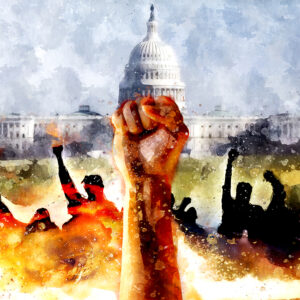Social media has an unimagined, unequaled, uncontrollable, and unpredictable ability to mobilize groups of people for antisocial action; to take a sliver of society and turn it into a mob.
Last month this new force in society was on display, from mobilizing anti-vaxxers in Los Angeles to the U.S. Capitol riot, resulting in five deaths, to the run-up of a weak stock, GameStop, by 1,800 percent.
These events, coupled with some strains of political thought being restricted on Facebook and Twitter, along with the outright banning of tweets from Donald Trump when he was still in office, have some in Congress convinced something should be done — often the precursor to ill-conceived legislation.
Conservatives want the protections granted by Section 230 of the Communications Decency Act, which provides Google, Facebook, and others a legal liability shield from third-party content posted on their platform, to be reformed. They believe they are disadvantaged by the liberal-leaning networks.
The hot issue of the moment in Congress is the price run-up of GameStop and other companies’ stocks. The primary platform most fingered so far is Reddit, but the active enabler was the app Robinhood which allows individuals (mostly day traders) to trade stock without commissions and in small amounts.
This Robinhood isn’t to be confused with the English folk hero, who stole from the rich to give to the poor, even though that is the intent of those who named the app. In reality, it is part of the Wall Street system and makes its money selling all those little trades to market-making firms. Its purpose is to make money, not to bring social justice to small traders.
I interviewed Sinan Aral, who studies social media at the MIT Sloan School of Management and is the author of “The Hype Machine: How Social Media Disrupts Our Elections, Our Economy and Our Health — and How We Must Adapt,” for “White House Chronicle,” the PBS television show which I host. He said of GameStop that it is imperative to find out what really happened. For example: When was the GameStop stock run-up taken over by big funds which stood to make huge profits, and some of which did?
Rep. Maxine Waters (D-Calif.), who chairs the House Financial Services Committee, has scheduled hearings. That is a beginning, but it certainly won’t be definitive. Congressional hearings seldom are.
Jarrod Hazelton, a Chicago-trained economist who once worked for a Connecticut hedge fund, concurred. It looks like GameStop was “the perfect storm,” he said, also on “White House Chronicle.”
Hazelton told me this never was a sudden viral event: The groundwork for the Reddit-fueled frenzy over GameStop was laid by professionals nearly a year ago.
It was social media that drove the madness, even though it was the big financial houses, like BlackRock (which reportedly made $3 billion on GameStop stock) which were the big winners. Speculation in the stock was already underway when trades took off, enabled and fed by Reddit posts and other social media shouting in essence “free lunch here.”
MIT’s Aral takes issue with the idea that crowds have a kind of folk wisdom. That idea was endorsed in a 2004 book, “The Wisdom of Crowds,” by James Surowiecki. But Aral points out that was the same year that Facebook was founded. In other words, a social media crowd isn’t the same as a fairground crowd trying to guess the weight of an ox, an example in Surowiecki’s book.
Crowds, it turns out, are wise if they are polled as individuals, but once they get on social media and have subscribed to a toxic idea, they aren’t wise. They are a single-minded mob, whether opposing vaccinations, trashing the great symbol of democracy, or running up a stock.
What is to be done about social media? Probably nothing. It is here like gun ownership or pornography. This one, too, we will have to suck up and live with.
With time we may get inured to social media and get better at discounting a lot of its disingenuous outpourings. But, from time to time, it will be harnessed for evil. Crowds are healthy, mobs not so.

